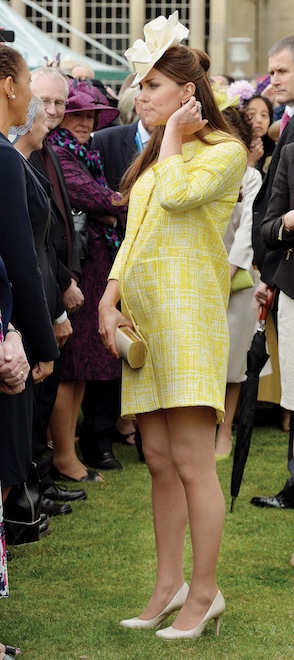The Royal baby will make you rich (if you’re lucky)
No economy-wide boost expected from William and Kate’s newborn
Britain’s Kate, The Duchess of Cambridge, during her visit to Humberside Fire and Rescue Service, in Grimsby, northern England Tuesday, March 5, 2013. The Duchess was visiting The Princeâs Trust Team program which is a 12-week personal development scheme, which helps unemployed 16-25 year olds build the skills and confidence they need to get a job. (AP Photo/Scott Heppell)
Share

Coming in the midst of Britain’s recession, the wedding of Prince William and Kate Middleton in April 2011 was a much-needed power shake for the country’s anemic economy. The Royal baby bump, though, seems poised to provide a much smaller boost.
Britain’s Centre for Retail Research (CRR)—always optimistic about the Royal family’s ability to pump sales—put the Royal baby’s stimulus effect at about half that of his or her parents’ nuptials. Consumer spending on baby-inspired festivities and sales of royal-themed paraphernalia is expected to come in at $386 million. By comparison, UK retailers raked in some $795 million during the Royal wedding celebrations.
Even British babywear retailers played down the impact of any Royal baby sales boost. “A royal birth is always good news,” Mothercare CEO Simon Calver told the Financial Times last week. But, he added: “We don’t necessarily see a huge uptick in activity for our business.” Mothercare has a host of new product lines aimed at baby-fond royalists, but the company is still on track to shutter 30 of its stores this year, as it struggles with the effects of the eurozone crisis.
Also, unlike in the case of the Royal wedding or the Queen’s Diamond Jubilee celebrations of 2012, “there will not be the great pageantry and celebratory public events, which likely had some beneficial impact in lifting tourism,” IHS Global Insight, a consultancy, noted in a recent client note.
On the up side, though, the birth of the Royal infant won’t trigger a national holiday, which will spare the British economy the costs of unrealized business activity. Last year, the country-wide shutdown for the Diamond Jubilee amounted to some $2 billion in lost output, according to British government estimates.
Besides, if the Royal baby won’t give much of a lift to the economy at large, she or he could sure make a fortune to a lucky few. Expect to see the baby version of the “Kate effect”—which regularly sends sales of clothing donned by the Duchess of Cambridge flying off the shelves—as soon as William and Kate start picking onesies, jeggings, bibs and bootees. When Victoria and David Beckham, arguably Britain’s second-favourite celebrity duo, picked the iCandy stroller for their newborn daughter, company sales skyrocketed to $15 million in 2011, up from less than $6 million in 2009, according to CRR.
And then, of course, there’s gambling. Online gaming site Ladbrokes has taken in some 50,000 bets on the name of the newborn since the Duchess went into labour this morning. The current favourites are Alexandra for a girl and James for a boy.